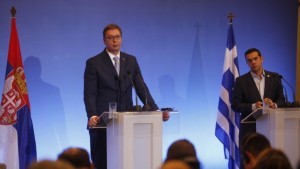The European Commission supports efforts for the European prospects of the Balkans, Prime Minister Alexis Tsipras said on Thursday in a joint press conference with Bulgarian Prime Minister Boyko Borisov and Serbian President Aleksandar Vucic, following meetings held in Thessaloniki.
“We fully support Serbia’s European course,” Tsipras said, while noting that Greece, Bulgaria and Serbia can play an important role as factors promoting stability in the region.
The Greek premier reported agreement of views on the need for stabilisation in the Former Yugoslav Republic of Macedonia (FYROM), saying that they had concurred on the necessity for substantive dialogue to find a mutually acceptable solution of the name dispute with Greece, which was a condition for FYROM’s accession progress.
In terms of infrastructure projects of joint interest, Tsipras listed the idea of a navigable link via rivers from Thessaloniki to Belgrade and a rail link from Thessaloniki to the Danube to rapidly move goods and people to central and northern Europe, as well as the Greece-Bulgaria Interconnector (IGB) and its extension to Serbia.
Tsipras said they should make use of initiatives to revive interest in the Balkan region and make it clear that Europe’s security “passes through the Balkans.”
He also noted the need for constant dialogue, cooperation and coordination of the three countries’ efforts in order to face the challenges but also exploit the opportunities offered, with security and stability in the Balkans as their common aim.
“There are dangers of destabilisation, of strengthening extremism and an increased influence of third countries in the Balkans and we do not have the luxury of forgetting institutional tools, of not proceeding with understanding,” he added.
Borisov, on his part, said he was “very satisfied by Prime Minister Alexis Tsipras and President Vucic,” while noting that it was “a dream for me to see the link between our countries, both for rail and road.”
The projects will be a priority for Bulgaria when it takes over the rotating EU presidency, he said.
“Three peoples together, we are not three countries but 10 times stronger,” Borisov added.
The sentiment was echoed by Vucic in his own statements, while he thanked Tsipras and Borisov for a “constructive and sincere discussion” and thanked them for supporting Serbia’s European prospects.
Serbia expected even stronger support in the coming period and was ready to participate in various projects with Greece and Bulgaria that were in the economic but also political interests of all three countries, he added. They had also discussed ways to link the citizens and businesses of all three countries in order to achieve better results in different areas, Vucic said.
“To sum up in one sentence the nature of this meeting in the best way, I would say that together, Greece, Bulgaria and Serbia are not just three times but 10 times stronger than when they are represented individually,” he said, stressing the importance of such trilateral meetings.
“Some others that continue to have specific unsolved problems – let us say within the Visegrad group – are incomparably more powerful when they are together than when they speak alone. I think we must use this model in the future more often and in different issues, to adopt positions alone and together so that we have incomparably better results for our three countries,” Vucic added.
“We are ready on all issues, in response to domestic and foreign challenges, to act together and in accordance with European principles and European standards,” he said.
Ask me anything
Explore related questions





